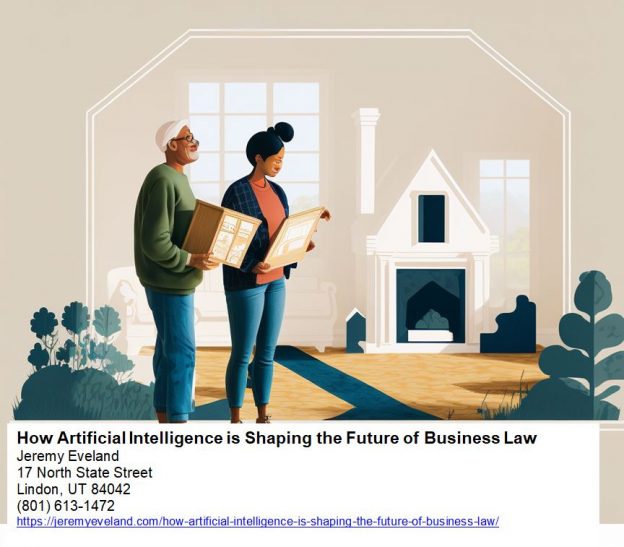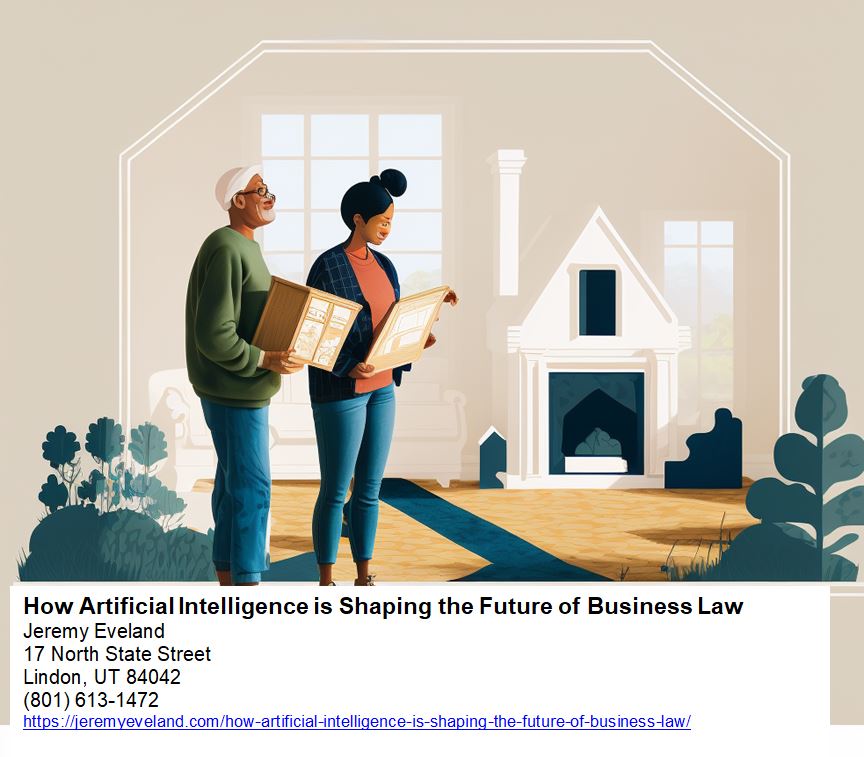Artificial Intelligence (AI) is changing the way we live and work, and it has also transformed the legal industry. AI technology is being used in various areas of law, including business law, to automate tasks that were once manual, time-consuming, and error-prone.
AI can help businesses and organizations to streamline their operations, reduce costs, increase efficiency, and improve decision-making. This paper aims to provide an overview of how AI is changing the face of Business Law.
Definition of Artificial Intelligence (AI)
AI refers to computer systems that can perform tasks that typically require human intelligence such as natural language processing, learning from experience or pattern recognition. AI encompasses a broad range of technologies such as machine learning (ML), deep learning (DL), natural language processing (NLP), computer vision and robotics. Machine learning algorithms allow computers to learn from data without being explicitly programmed whereas Deep Learning algorithms allow computer systems to learn by example at multiple levels.
Overview of AI in Business Law
AI has the potential to transform many areas of business law such as contract drafting & management, legal research & analysis compliance management , intellectual property rights protection among others.. By automating repetitive tasks using machine learning algorithms for instance contract reviewing or document analysis or eDiscovery review for large scale litigation projects , lawyers can focus on more complex legal issues while improving productivity and reducing errors. In contractual relationships between businesses or individuals, Al-powered tools help identify clauses that may be unusual or problematic within a document – alerting lawyers so they can be addressed in a timely manner.
Additionally these tools point out inconsistencies within negotiated contracts – ensuring clarity between parties involved. For compliance management which covers regulatory compliance & risk management activities essential for any business organization – Companies are increasingly turning towards AI & automation where large amounts of data need constant monitoring over several jurisdictions thus automating the process through AI can lower errors and save time.
Purpose of the Paper
The purpose of this paper is to provide a comprehensive overview of how artificial intelligence is revolutionizing business law. By examining various applications of AI, this paper provides insights into the benefits and challenges associated with using AI in different areas, including contract drafting, legal research & analysis compliance management and intellectual property rights protection.
The conclusion summarizes the potential impact of AI on Business Law and highlights some ethical considerations surrounding the use of these technologies in legal practice. Through examining current trends, we hope to illustrate how organizations can adopt new technologies effectively to stay ahead in an ever-changing legal landscape.
AI and Contract Drafting
Explanation of Contract Drafting
Contract drafting is one of the fundamental tasks in the legal profession. It is a process that involves the creation and writing of legal documents such as contracts, agreements, and deeds. A well-drafted contract must define the terms and conditions of an agreement to avoid any ambiguities or misunderstandings.
Legal professionals must ensure that these documents meet all legal requirements, including local, state, or federal laws. The process can be time-consuming and tedious due to the number of variables involved in creating a legally binding document.
How AI is used in Contract Drafting
Artificial Intelligence (AI) has started to revolutionize the field of contract drafting. With its ability to automate repetitive and predictable tasks, AI systems offer several advantages when it comes to drafting contracts.
AI software can analyze large volumes of data from various sources such as case law, codes, regulations or previous contracts. It can identify relevant clauses based on context and suggest revisions based on best practices or previous successful resolutions.
Moreover, AI software has natural language processing capabilities that allow it to understand complex legal concepts and interpret them accurately for use in contract drafting. This technology aids lawyers by suggesting language for specific clauses based on precedent language from other similar contracts.
Benefits and Challenges of AI in Contract Drafting
Using Artificial Intelligence for contract drafting has many benefits; it saves time since machines can carry out some tasks faster than humans while minimizing errors resulting from human oversight or fatigue. Automated systems are often more accurate than humans since they have access to more data faster than humans ever can. However, there remain challenges which need addressing before we rely solely on automated systems for contract creation.
Firstly ethical considerations surrounding delegating certain labor-intensive aspects of this process could be viewed as problematic due to outsourcing work which may traditionally have been carried out by legal professionals. Secondly, there is a risk that AI systems may be limited in their ability to understand the context and nuance of language effectively.
Overall, using AI for contract drafting brings significant benefits to the legal industry. Nevertheless, human input will remain essential in ensuring that these systems are integrated and used effectively to achieve optimal results.
AI and Legal Research
Explanation of Legal Research
Legal research is the process of finding, analyzing, and interpreting legal information. It is a crucial part of any lawyer’s work and involves reading through a vast amount of legal documents such as statutes, case law, and regulations to find relevant information for a particular case. Traditionally, legal research was done manually by lawyers and their paralegals.
It was an extremely time-consuming process that required sifting through stacks and stacks of paper documents. The advent of technology has made this process more efficient with the introduction of digital databases such as LexisNexis, Westlaw, and Bloomberg Law.
How AI is used in Legal Research
Artificial intelligence has revolutionized the way lawyers conduct legal research today. AI-powered software can scan through thousands of legal documents at lightning speed to retrieve relevant information for a particular case. For instance, ROSS Intelligence is an AI-powered software that helps lawyers conduct complex legal research efficiently.
AI technology can also help lawyers analyze how judges have ruled on similar cases in the past by using predictive analytics. This not only saves time but also assists lawyers in crafting arguments that are likely to be successful based on how judges have ruled in the past.
Benefits and Challenges of AI in Legal Research
One significant benefit of using AI for legal research is its speed and efficiency. Lawyers can spend less time conducting research manually allowing them to focus on other areas like counseling clients or preparing arguments. Moreover, AI’s ability to analyze vast amounts of data means that lawyers will not miss out on essential details relevant to their cases.
However, there are specific challenges associated with using AI for legal research as well. One issue concerns data privacy since some confidential data might be stored online if lawyers use cloud-based solutions.
Additionally, there’s currently no consensus among legal professionals on the ethical use of AI in legal research, which could lead to confusion and mistrust. Overall, AI is transforming legal research, but lawyers must also carefully consider its limitations and possible ethical implications.
AI and Predictive Analytics
Explanation of Predictive Analytics
Predictive analytics is a technique used to analyze data in order to make predictions about future events or trends. This is done by applying statistical algorithms and machine learning techniques on historical data to identify patterns and relationships that can be used to predict future outcomes. In the context of business law, predictive analytics can be used to identify potential legal risks, forecast litigation outcomes or even predict the success rate of a case.
How AI is used in Predictive Analytics
Artificial intelligence (AI) plays a significant role in predictive analytics by providing advanced technology for analyzing large amounts of data. AI-powered predictive analytics tools use machine learning algorithms, natural language processing (NLP) and neural networks to process vast amounts of structured and unstructured data. This enables lawyers and legal professionals to gain insights into complex legal issues, such as contract breaches, regulatory compliance violations or even patent infringement cases, with greater speed and accuracy than traditional methods.
Benefits and Challenges of AI in Predictive Analytics
The benefits of using AI-powered predictive analytics tools for business law are numerous. They help lawyers make informed decisions based on real-time insights, reduce the time spent on repetitive tasks such as reviewing contracts or conducting legal research thus allowing more time spent analyzing critical information.
Furthermore, these tools can help identify patterns that may not be immediately obvious which can lead to better risk management strategies. However, there are also challenges associated with using AI for predictive analytics in business law.
One major challenge is ensuring the quality of input data which determines the accuracy of predictions made by these systems. Additionally, there may be ethical concerns surrounding the use of personal data for prediction purposes particularly when it comes to privacy rights issues.
Overall, while there are some challenges associated with using AI-powered predictive analytics tools for business law purposes , the benefits of using these technologies far outweigh the costs. They provide lawyers with new insights into complex legal issues, help identify potential risks and opportunities and ultimately improve the quality of decision-making in legal settings.
AI and Compliance Management
Explanation of Compliance Management
Compliance management is the process of ensuring that an organization follows all applicable laws, regulations, and internal policies. It involves identifying and assessing risks, implementing controls to mitigate those risks, monitoring compliance with those controls, and reporting on compliance activities to internal and external stakeholders. Compliance management is critical for organizations because it helps to prevent legal violations that could lead to fines, legal action or damage to the organization’s reputation.
How AI is used in Compliance Management
AI is being used in compliance management in a variety of ways. One way AI is being used is through the automation of compliance monitoring tasks.
This includes using natural language processing (NLP) algorithms to monitor regulatory updates and analyze large volumes of data from various sources for patterns that may indicate non-compliance. Another way AI can be used in compliance management is through the implementation of machine learning (ML) algorithms that can learn from past violations and provide suggestions on how to prevent future violations.
Benefits and Challenges of using AI for Compliance Management
The benefits of using AI for compliance management are numerous. Firstly, it can improve efficiency by automating manual processes such as monitoring regulatory updates, which allows employees more time to focus on high-value tasks such as analysis or decision-making.
Secondly, it reduces errors by providing real-time insights into areas where non-compliance may occur; thus allowing organizations to take corrective measures quickly before penalties accrue. However, there are challenges associated with using AI for compliance management too; one key challenge is ensuring accuracy – this means training algorithms accurately so they can understand complex regulations which in turn requires experts’ feedback during training processes.. Another challenge could be ensuring transparency since some ML models will perform difficult-to-understand computations which increases difficulty in interpreting results thereby giving rise to potential ethical issues around bias and accountability.
Conclusion
Overall, AI has the potential to revolutionize compliance management by making it more efficient, accurate and effective. By automating manual processes such as monitoring regulatory changes and analyzing large volumes of data can help organizations to identify potential areas of non-compliance before they occur.
However, there is a need for experts to oversee the system with a focus on transparency and accountability for the results generated by using AI in this field. If these challenges are adequately addressed, AI could become an essential tool in the future of compliance management in businesses.
AI and Intellectual Property Rights (IPR) Protection
Explanation on IPR Protection
Intellectual Property Rights (IPR) refer to the legal rights that protect inventions, literary and artistic works, and symbols used in commerce. These rights include patents, copyrights, trademarks, trade secrets, and industrial designs. IPR protection is essential for businesses to safeguard their innovations from exploitation by competitors or others.
How AI is used for IPR protection
AI-based solutions have revolutionized the process of protecting intellectual property rights. AI algorithms are capable of analyzing vast amounts of data and identifying patterns that may indicate infringement or counterfeiting.
This technology can be used in several ways to protect IPRs:
Patent Searches:
An AI algorithm can scour patent databases from around the world to determine if an invention has already been patented.
Trademark Monitoring:
AI can be used to monitor online marketplaces and social media platforms for instances of trademark infringement.
Piracy Detection:
Algorithms can scan digital content such as music, movies, and software for signs of piracy or illegal distribution.
Benefits and challenges associated with using AI for IPR protection
One significant benefit of using AI for IPR protection is increased efficiency. By automating tedious tasks like patent searches or trademark monitoring, companies can save time and money while ensuring their intellectual property remains secure.
Additionally, relying on machine learning algorithms means that businesses don’t have to rely on human interpretation alone when identifying potential infringements. However, there are also some challenges associated with using AI for IPR protection.
One issue is ensuring that the algorithms being used are accurate and reliable. A poorly designed algorithm could lead to false positives or missed infringements.
Additionally, some experts argue that relying too much on automation could lead to a lack of human oversight, potentially leading to oversights that might otherwise be caught by a human analyst. Another challenge is managing the vast amounts of data involved in IPR protection.
AI solutions generate a lot of data, and it can become overwhelming to analyze, categorize, and store. Companies must have robust data management systems in place to ensure that the information gathered by AI algorithms is organized and accessible when needed.
AI Ethics & Regulations
Ethical considerations surrounding the use of AI
As AI grows in popularity and becomes more integrated into everyday business practices, it is essential that we consider the ethical implications of its use. One major concern is the potential for AI to perpetuate existing biases or exacerbate social inequalities. For example, if an AI system is trained on biased data, it is likely to produce biased results.
As such, ethical considerations must be made to ensure that AI systems are not perpetuating social harm. Another ethical consideration in the use of AI is job displacement.
As businesses continue to adopt AI technologies that automate tasks previously performed by humans, there is a potential for significant job losses across various industries. This raises important questions about how society should handle these changes and what measures should be put in place to support workers who are displaced.
Regulations governing the use of AI
Currently, there are limited regulations governing the use of AI technology in business law. However, as more businesses adopt these technologies and their impact becomes increasingly evident, governments around the world are beginning to develop regulatory frameworks.
One example of this can be seen in Europe’s General Data Protection Regulation (GDPR), which includes provisions concerning automated decision-making and profiling. These regulations require businesses using these technologies to provide transparency surrounding their decision-making processes and give individuals a right to challenge decisions made by automated systems.
In addition to government regulations, industry organizations are also developing codes of ethics for the responsible development and use of AI technology. The IEEE Global Initiative on Ethics of Autonomous and Intelligent Systems, for example, has developed a set of guidelines intended to encourage best practices among organizations developing these technologies.
Conclusion
As we have seen throughout this paper, artificial intelligence has had a profound impact on various aspects within business law. From contract drafting and legal research to compliance management and intellectual property rights protection, AI has brought about numerous benefits and challenges.
However, as the use of AI in business law continues to grow, it is essential that we consider the ethical implications of its use and establish regulations to ensure its responsible development. While there are undoubtedly concerns surrounding the use of AI technology, it is important that we remain optimistic about its potential benefits.
By leveraging these technologies responsibly, businesses can streamline their operations, reduce costs, and provide better services to their clients. With careful consideration given to ethical considerations and regulatory frameworks established to guide their development and use, AI technologies can be powerful tools for advancing innovation within business law.
Areas We Serve
We serve individuals and businesses in the following locations:
Salt Lake City Utah
West Valley City Utah
Provo Utah
West Jordan Utah
Orem Utah
Sandy Utah
Ogden Utah
St. George Utah
Layton Utah
South Jordan Utah
Lehi Utah
Millcreek Utah
Taylorsville Utah
Logan Utah
Murray Utah
Draper Utah
Bountiful Utah
Riverton Utah
Herriman Utah
Spanish Fork Utah
Roy Utah
Pleasant Grove Utah
Kearns Utah
Tooele Utah
Cottonwood Heights Utah
Midvale Utah
Springville Utah
Eagle Mountain Utah
Cedar City Utah
Kaysville Utah
Clearfield Utah
Holladay Utah
American Fork Utah
Syracuse Utah
Saratoga Springs Utah
Magna Utah
Washington Utah
South Salt Lake Utah
Farmington Utah
Clinton Utah
North Salt Lake Utah
Payson Utah
North Ogden Utah
Brigham City Utah
Highland Utah
Centerville Utah
Hurricane Utah
South Ogden Utah
Heber Utah
West Haven Utah
Bluffdale Utah
Santaquin Utah
Smithfield Utah
Woods Cross Utah
Grantsville Utah
Lindon Utah
North Logan Utah
West Point Utah
Vernal Utah
Alpine Utah
Cedar Hills Utah
Pleasant View Utah
Mapleton Utah
Stansbury Par Utah
Washington Terrace Utah
Riverdale Utah
Hooper Utah
Tremonton Utah
Ivins Utah
Park City Utah
Price Utah
Hyrum Utah
Summit Park Utah
Salem Utah
Richfield Utah
Santa Clara Utah
Providence Utah
South Weber Utah
Vineyard Utah
Ephraim Utah
Roosevelt Utah
Farr West Utah
Plain City Utah
Nibley Utah
Enoch Utah
Harrisville Utah
Snyderville Utah
Fruit Heights Utah
Nephi Utah
White City Utah
West Bountiful Utah
Sunset Utah
Moab Utah
Midway Utah
Perry Utah
Kanab Utah
Hyde Park Utah
Silver Summit Utah
La Verkin Utah
Morgan Utah
Business Law Consultation
When you need help from a Business Lawyer in Utah call Jeremy D. Eveland, MBA, JD (801) 613-1472 for a consultation.
Jeremy Eveland
17 North State Street
Lindon UT 84042
(801) 613-1472
Related Posts
Common Legal Issues That Should Involve A Business Lawyer
Corporate Attorney West Valley City Utah
What Does A Corporate Counsel Do?
Can Corporate Counsel Represent A Corporation In Court?
Corporate Attorney Salt Lake City Utah
Business Succession Lawyer Saratoga Springs Utah
Estate Planning Salt Lake City Utah
Business Succession Lawyer Holladay Utah
Corporate and Business Law in Utah
Does Starting My Own Business Mean I Get A Corporation Automatically?
Impact of Environmental Regulations on Business Law Compliance
Business Lawyer South Jordan Utah
Business Lawyer Millcreek Utah
Business Lawyer Taylorsville Utah
How Artificial Intelligence is Shaping the Future of Business Law



